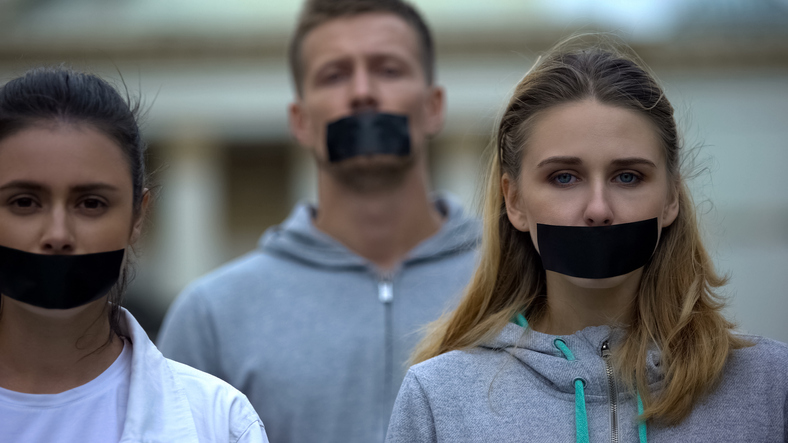A national poll found 62 percent of Americans are afraid to share political views, a four percentage point increase from a similar survey conducted in 2017.
The survey, released by the Cato Institute on July 22, found self-censorship ran the political spectrum. Only respondents who described themselves as “strongly liberal” stated they felt free to express their viewpoints.
When presented with the statement “the political climate these days prevents me from saying things I believe because others might find them offensive,” 58 percent of strong liberals disagreed. Seventy-seven percent of conservatives and strong conservatives agreed with the statement, as did 64 percent of moderates and 52 percent of liberals.
Particularly striking is that those with moderate viewpoints are now afraid to speak up, says Emily Ekins, PhD., a research fellow and director of polling at Cato.
“This is about the majority of liberals, the majority of moderates, and the majority of conservatives who feel like they can’t share their views, which indicates it’s not just some wacky fringe or racist views that people aren’t sharing but rather perhaps more mundane views,” Ekins said.
Consequences of Silence
Restraining oneself from expressing political viewpoints goes beyond politeness, Ekins says.
“There has been such a chilling effect on speech, its effectively raised the transaction cost of expressing yourself politically,” Ekins said.
The climate of silence has also undermined political engagement, Ekins says. Poll respondents said they were afraid of making political contributions because it could hurt them in the workplace.
“People think, why would they want to risk losing friends, losing their job, or suffer economic punishment just by weighing in on political matters, so they just disengage,” Ekins said. “That is going to have ramifications for the political process.”
Free speech is still protected at the voting booth, where votes are cast privately, Ekins says.
“That is a core component of democracy,” Ekins said. “But there are all sorts of other aspects to the democratic process that are not done in private, whether that be contributing your time, talents, and resources to a cause or candidate that you believe in.”
One particular concern recently has been the pandemic, Ekins says.
“We just don’t have all the facts and all the information, and so a lot of the guidance that was given is often changing,” Ekins said. “Then, people are frustrated about those changes, and so I would suspect that many people have just decided to disengage from that topic as well.”
Kelsey Hackem, J.D., (khackem@gmail.com) writes from Washington state.
